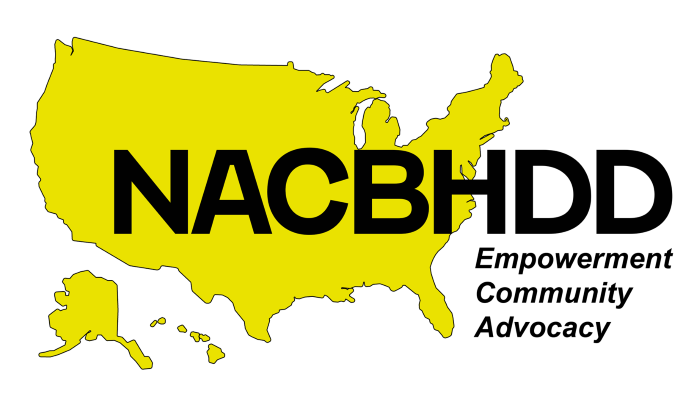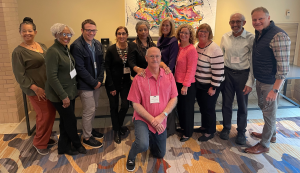Presented by:




2024 NDBH Conference Presentations
Successful Strategies to Support Individuals with Complex
Needs to Improve Outcomes
The 65th Annual Conference

AGENDA & PRESENTATIONS
Pre-Conference: Sunday, November 3rd
Cutting Edge Peer and Family Support Approaches for Adults and Children with Complex Needs
Peer and family support are critical and often unrecognized contributors to positive outcomes for persons with complex needs. Innovative population-specific models are emerging which are filling a much-needed gap, including peer programs in schools and for older persons experiencing a range of mental health substance use problems. At the same time, new programs have also been developed for families that are providing support: again, for children/adolescents, for older adults, and persons with complex healthcare and behavioral health needs. The preconference will provide an overview of these cutting-edge programs: How such programs were developed, what they do, their accomplishments, and issues related to implementation, including barriers and challenges that came up, and how they were addressed.
Speakers: Rob Walker- Massachusetts Dept of Mental Health (MA), Justin Volpe -National Association of State
Mental Health Program Directors (VA); Susan Teare, MFA- Yellow Tulip Project (ME); Pat Hunt- Family-Run
Executive Director Leadership Association (ME)
Presentations
From Research to Results: Engaging Families Yields Positive Outcomes
National Overview: Cutting-edge Approaches for Adults and Children with Complex Needs
Peer Integration from a National Perspective
Older Adult Peer Support: Risks, Resources and Rewards
Piloting a State Police Diversion Program – Delaware
Program Implementation: Cutting Edge Approaches for Persons with Complex Needs
Family Organizations and Peer Support
Session 1: Monday, November 4th
Supporting Women with Complex Perinatal Needs
The urgency of rapid access to integrated services could not be more crucial than during the prenatal period, both for the mother and unborn child. Mental illness and substance misuse during the pre- and post-natal times in a woman’s life, can and does have devastating effects on her life and that of her child. This session will discuss state-wide collaborations, from Connecticut and Iowa, that not only
focus on early access to medical specialists, but also establish a connected constellation of integrated behavioral health providers, access to stable housing and to other social determinants impacting healthy outcomes for women and their children. Speakers will present concrete programmatic and policy changes necessary to fully support these women with complex needs.
Speakers: Ira Chasnoff, MD – University of Illinois, College of Medicine (IL); Shelly Nolan, MS- Department of
Mental Health and Addiction Service (CT)
Presentations
Addressing Complex Behavioral Needs with Youth
Youth faced with complex behavioral health needs encounter multifaceted challenges that often transcend individual and familial contexts, necessitating comprehensive interventions within broader systems. This panel will explore both historically proven and innovative approaches in addressing the needs of youth with behavioral health challenges. This will include key ideas around collaboration, lessening barriers, and overcoming other challenges in complex care approaches. Our panelists will share insights garnered from their diverse experiences in the field encompassing community and state-based initiatives. Through interactive discussions and state and local examples, attendees will gain a deeper understanding of the interconnected systems impacting the well-being of youth people, including behavioral health services, education, justice system and other social support networks.
Speakers: Elizabeth Manley, MSW – Innovations Institute (CT); Monica Stevens, PhD – Tulane University School of
Medicine (LA)
Presentations
Addressing Complex Behavioral Needs with Youth
Addressing the Needs: Speaking From and For the Front Line
Complex Needs and System Responses to Substance Misuse
This session will shed light on the latest advancements, research-driven interventions, and collaborative efforts aimed at improving outcomes for individuals struggling with substance use. Panelist wills discus various interventions, including, but not limited to: integrated care models, technology solutions, policy driven change, community engagement, and more. Through engaging
dialog with our panelists, participants will gain valuable perspectives on how healthcare systems can better prevent, intervene, and support individuals on their journey towards recovery and wellness.
Speakers: David G. Stewart, PhD – California School of Professional Psychology (CA); Johanna Braud- Louisiana
Supreme Court Specialty Courts Program (LA)
Presentations
Session 2: Tuesday, November 5th
Individuals with Intellectual or Developmental Disabilities (I/DD): Working Across Systems to Provide Person-Centered Care
Individuals with intellectual and developmental disabilities (I/DD) are at high risk for co-occurring mental health conditions and have a broad spectrum of unique needs. A strong coordinated continuum and system of care is key to providing appropriate person-centered care. This session will highlight best-practice initiatives to address the unique needs of this high-risk population. This session will include information about The Link Center, which is funded by the Administration for Community Living and works to improve supports available to children and adults with intellectual and developmental disabilities (I/DD), brain injuries, and other cognitive disabilities with co-occurring
mental health conditions. The Link Center provides training and technical assistance and advances systems change that will increase access to effective services and supports for people with cooccurring conditions.
Speakers: Mary Sowers- National Association of State Directors of Developmental Disabilities Services (VA);
Brian Hart- CEO, ShiftAbility Transformation Consulting (OH)
Presentations
Smart Living: Using Technology to Solve the Staffing Crisis and Improve Outcomes
Individuals with Traumatic Brain Injury (TBI) and Behavioral Health Conditions
Individuals who have experienced traumatic brain injury (TBI) often go undetected across behavioral health systems. Traumatic brain injury (TBI) is a common neurological condition that can affect a person’s ability to regulate cognition, emotion, and behavior. Recognizing individuals with TBI in the context of behavioral health treatment is key to accurate diagnosis and providing appropriate treatment and accommodations. This session will provide information and data on the link between TBI and behavioral health conditions. Presenters will include recommendations based on clinical experience about how behavioral health programs and professionals can better meet the needs of their clients who also have had a TBI. Further, resources will be highlighted for working across systems to ensure individuals with traumatic brain injury and behavioral health conditions receive appropriate
person-centered care.
Speakers: Kim Gorgens, PhD – University of Denver (CO); Rebeccah Wolfkiel, MPP – National Association of State
Head Injury Administrators (VA)
Presentations
Brain Injury is Behavioral Health
Collaborative Approaches for Older Individuals with Complex Needs
The needs of older individuals can be very complex, not just due to normal physiological and cognitive changes due to aging, but also their higher risk for more complex pathological changed, loses of natural supports, and more barriers to transportation and finances. The Program of All-inclusive Care for the Elderly (PACE), an evidence-based proven, collaborative care approach for older individuals with complex needs, does not uniformly include treatment for mental health and substance misuse. This session will present how behavioral health care was added to a PACE team and their integration as a collaborator was achieved and improved patient outcomes. In addition, this session will present work done by the National Coalition on Mental Health and Aging that provides opportunities for
professional, consumer and government organizations to work together towards improving the availability and quality of mental health, preventive and treatment strategies to older Americans and their families through education, research and increased public awareness.
Speakers: Susan Nelson, MD, FACP, FAAHPM – Ochsner Health Network (LA); Kathleen Cameron, MPH- National
Center for Healthy Aging (VA)
Presentations
Collaborative Approaches for Older Individuals with Complex Needs, Cameron
Collaborative Approaches for Older Individuals with Complex Needs, Nelson
Session 3: Wednesday, November 6th
Cross Cutting Strategies for Integrating Behavioral Health and Primary Care
There is growing awareness for the need to work across systems to provide person-centered care for the unique needs of individual who have co-occurring behavioral health and physical health issues. Using First Episode Psychosis programs as an example, this session will provide strategies for how a best practice that involves multi-system collaboration can evolve from an ides – to implementation – to sustainability. Further, this session will include information on the recent Centers for Medicare and Medicaid (CMS) Innovation in Behavioral Health Model (IBH) demonstration, which is a state-based model, led by state Medicaid Agencies, with a goal of Aligning payment between Medicaid and Medicare or integrated behavioral health and primary care services.
Speakers: David Shern, PhD – National Association of State Mental Health Program Directors (VA); Karin E. Bleeg, MPH, Acting Division Director, Division of Health Innovation & Integration, State and Population Health Group | Center for Medicare & Medicaid Innovation | CMS
Presentations
Coordinated Specialty Care for First Episode Psychosis: An Example of Science to Practice
The Innovation in Behavioral Health (IBH) Model
Healthy Blue: A Value-based Contract (VBC) Promoting a Collaborative Model for Individuals with Complex Medical and Behavioral Care Needs Addressing the Social Determinants of Care
The primary goal of the Integrated Collaborative Care Model (ICCM) is to ensure that members receive holistic treatment throughout the full spectrum of care and gain the value of integration of physical and behavioral healthcare through a community navigator. The model adopted by Healthy Blue VBC addresses the need for person-centered, integrated care using evidence-based supports, and services for its members. This presentation will present data on the ICCM model that has been implemented in a Federally Qualified Health Center setting with a focus on plans for individuals with psychiatric and substance use disorders.
Speakers: Chatrian Roberson, MPH- Access Health Louisiana (LA); Cheryll Bowers-Stevens, MD – Healthy Blue Louisiana (LA)
Presentations